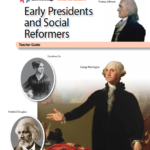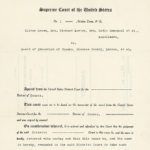On May 17, 1954 the Brown v. Board of Education decision was made. This landmark Supreme Court decision declared that laws establishing separate public schools for black and white children were unconstitutional. The Brown v. Board of Education ruling overturned the Plessy v. Ferguson decision of 1896, which allowed state-sponsored segregation in public schools. To support teachers as they commemorate this important anniversary in their classes, the Share My Lesson team has selected a variety of free lesson plans, educational resources and classroom materials about equity, particularly in schools.
IRL 1: Free Speech in Schools Podcast
We’re digging into four incredibly important Supreme Court cases – four cases that have shaped how we interpret the meaning of free speech in public schools. Is political protest allowed in class? Is lewd speech covered by the First Amendment? Can school administrators determine what students can and can’t say in the school newspaper? Listen in, and find out how students and schools have gone head to head over how First Amendment rights apply in a public school setting.
The Rule of Law and Public Health: A Socratic Seminar
For this high school Socratic Seminar, students will be asked to examine various readings and videos on public health and the rule of law and then explore the question “What role does the law play in protecting our health?” Encourage students to be prepared, participate actively, use evidence, listen carefully, and ask thoughtful questions of their peers throughout the seminar. There are resources to explore several public health examples (e.g., clean water, coal dust, COVID-19) included in this seminar guide, so feel free to select one or more, and adapt to your needs.
Free Speech Essentials
Do your students know what they’re free to say online? At school? On a public street corner? From censorship to cyberbullying, the First Amendment and the freedoms it protects are as hotly contested as ever. This EDCollection explores 16 free speech debates ranging from the founding of our nation to recent headlines to illustrate what free speech actually means, where it comes from, and how far it can go. Whether you’re a social studies teacher looking for a complete unit or an English teacher looking to spend a single class period on free expression, there’s something for everyone. Free registration required.
Local Politics: The Need for Compromise
This lesson examines the process of local decision making and its need for citizen input and compromise. Students simulate a local city/county council session and advise the council on public policy. Students are asked to consider the viewpoints of different citizen groups in order to reach a compromise that will benefit the entire community. This lesson can be used with a unit on local politics and can be adapted to reflect issues of compromise in your school or community. Free registration required to access the lesson plan.
Brown v. Board of Education (1954) eLesson
After the Civil War, the 14th Amendment was passed to grant citizenship to former slaves and protect them from civil rights violations in their home states. Public schools were relatively rare throughout the United States, but were often segregated by race where they existed. The same Congress that passed the 14th Amendment created racially segregated schools for the District of Columbia. In the 20th century, the National Association for the Advancement of Colored People (NAACP) began a litigation campaign designed to bring an end to state mandated segregation, calling attention to the shabby accommodations provided for blacks, as well as arguing the damaging psychological effects that segregation had on black school children. One case was brought on behalf of Linda Brown, a third-grader from Topeka, Kan.
Deliberation Materials: Should Voting Be Compulsory in the United States? (Middle School)
Should voting be compulsory in the United States? This activity includes a deliberation reading and glossary, as well as accompanying handouts to give students additional information on the topic and to guide them through the deliberation process from planning to reflection. Deliberation teaches people how to discuss controversial issues by carefully considering multiple perspectives and searching for consensus. In preparation for deliberations, all participants read common, balanced background information on the issue. During the discourse, they offer arguments for each position on a contested public issue, first drawing from the text and then bringing in their own experiences.
Individuals Influence Public Policy
In this lesson, students are presented with a controversial school policy and given two viewpoints on the issue. They are then divided into groups, and asked to provide reasons for and against the policy. After deciding whether the policy should be changed or not, the students are asked to reflect on why policies might change and what factors influence policy decisions.
Engel v. Vitale (1962)
Does the recitation of a prayer in public schools violate the Establishment Clause of the First Amendment? A Jewish student sued a New York school board over the daily recitation of a prayer. Middle school level also available.
American Reformers (CKHG Unit)

This unit (the second part of Early Presidents and Social Reformers) focuses on the efforts to improve American society in the early 1800s. Across 6 lessons, students learn about the temperance movement, free public education, the abolitionists’ crusade to abolish slavery, and the early women’s rights movement. The unit explores early reformers’ legacy in ongoing modern-day struggles for equality and civil rights.
